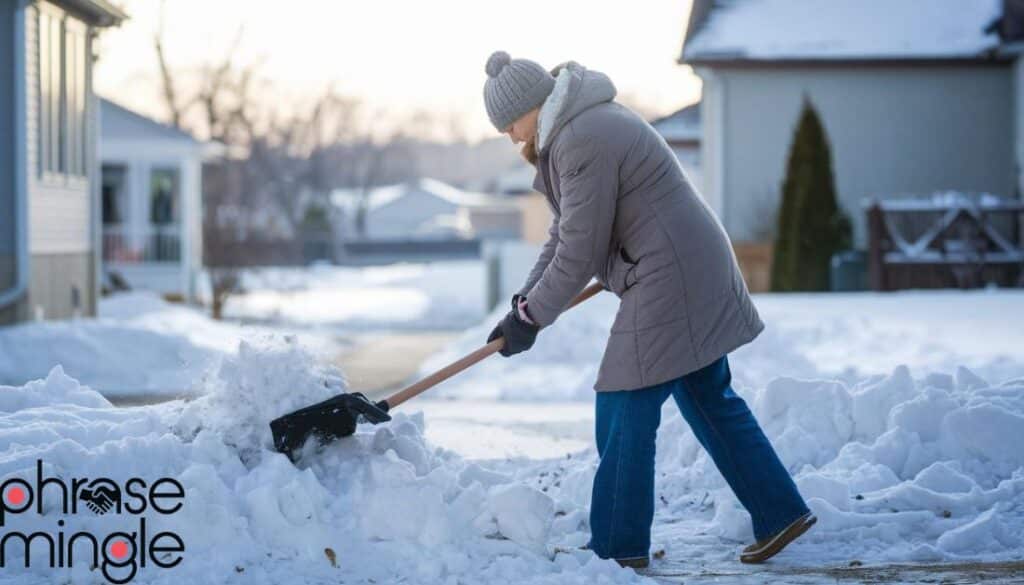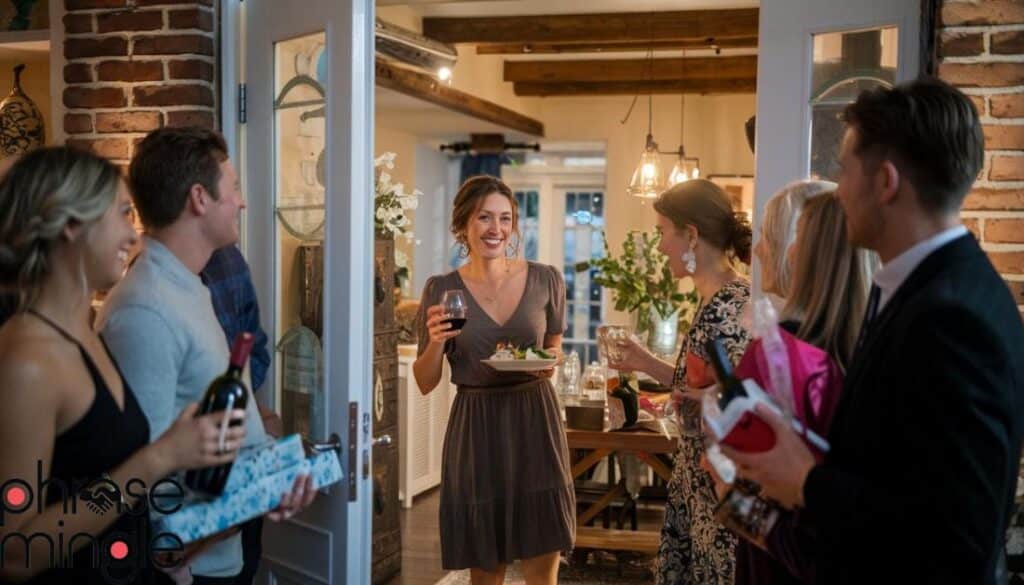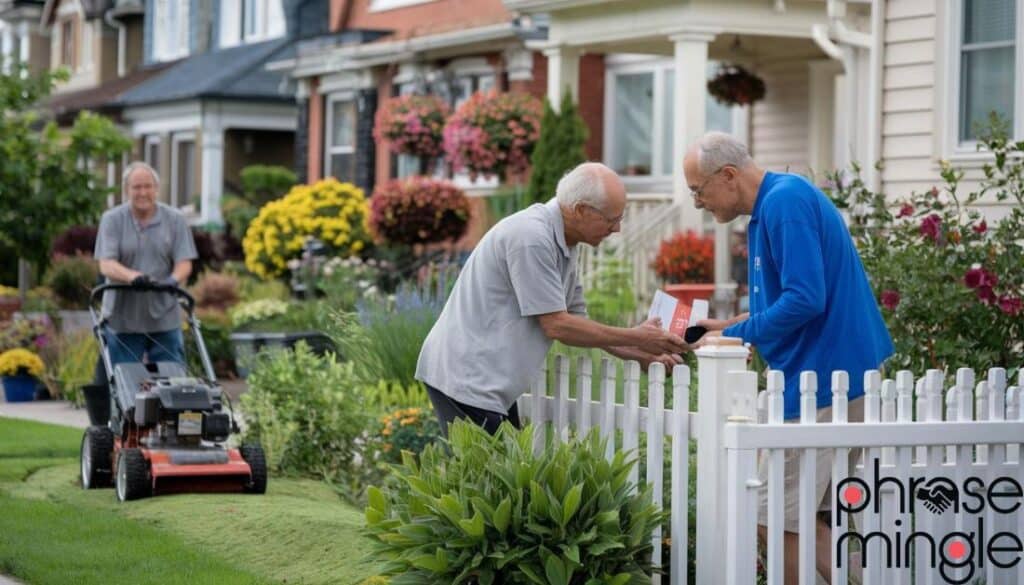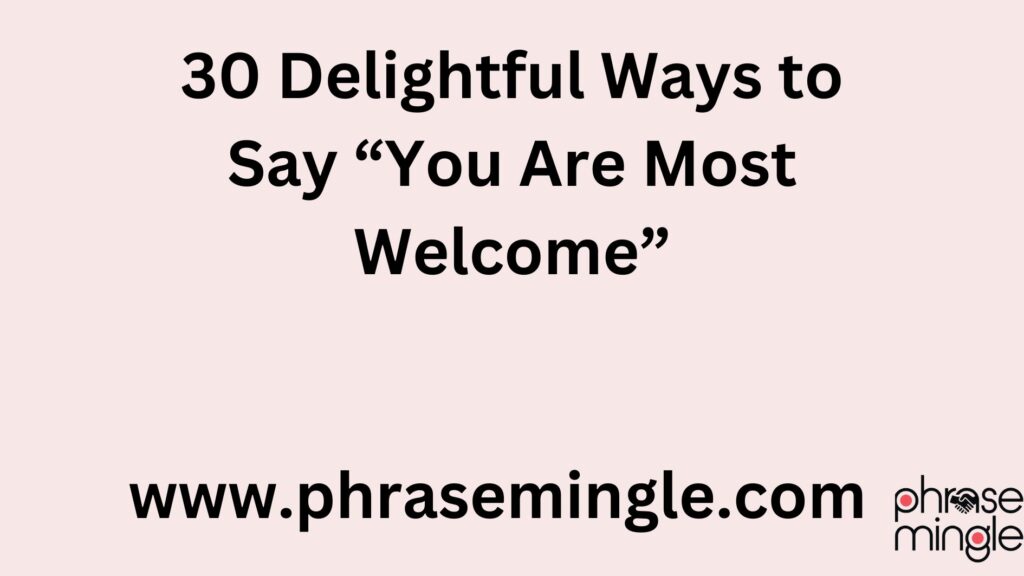In our daily interactions, we often find ourselves on the receiving end of gratitude. While a simple “you’re welcome” suffices, expanding your repertoire of gracious responses can elevate your communication skills and leave a lasting impression.
This comprehensive guide explores 30 alternative ways to say “you are most welcome,” delving into various contexts and cultural nuances. Let’s embark on this journey to master the art of acknowledging gratitude with finesse and warmth.
Casual and Friendly Expressions

1.”No sweat!”
This laid-back phrase conveys that the task or favor was effortless and didn’t cause any inconvenience.
- Example:
- Friend: “Thanks for helping me move those boxes!”
- You: “No sweat! Happy to lend a hand.”
- Explanation: This response emphasizes the ease of the task and your willingness to help, fostering a sense of camaraderie.
2.”Don’t worry about it”
This reassuring phrase lets the other person know that their request or the favor you did wasn’t a burden.
- Example:
- Coworker: “I appreciate you covering my shift last minute.”
- You: “Don’t worry about it. We all need a hand sometimes.”
- Explanation: This response alleviates any potential guilt the person might feel for asking for help, reinforcing a supportive relationship.
3.”It’s nothing”
Similar to “don’t worry about it,” this phrase downplays the effort involved in your assistance.
- Example:
- Neighbor: “Thank you for watering my plants while I was away.”
- You: “It’s nothing. I enjoyed seeing them grow!”
- Explanation: This response minimizes the perceived effort, making the person feel comfortable about accepting help.
4.”Anytime, pal”
This friendly response indicates your willingness to help again in the future.
- Example:
- Friend: “Thanks for the ride to the airport.”
- You: “Anytime, pal. Have a great trip!”
- Explanation: By using “pal” and offering future assistance, this response strengthens the bond between friends.
5.”No biggie”
Another casual way to express that the favor or task wasn’t a significant inconvenience.
- Example:
- Sibling: “I really appreciate you picking up my dry cleaning”
- You: “No biggie. I was in the area anyway”
- Explanation: This response further emphasizes the ease of the task, making the other person feel that their request wasn’t imposing.
Professional and Formal Responses

6.”I’m glad I could be of assistance”
This phrase expresses personal satisfaction in being helpful, suitable for professional contexts.
- Example:
- Client: “Thank you for your prompt response to my inquiry.”
- You: “I’m glad I could be of assistance. Please don’t hesitate to reach out if you need further information.”
- Explanation: This response not only acknowledges the gratitude but also invites future interactions, fostering a strong professional relationship.
7.”It was my pleasure to help”
A classic formal response that conveys genuine enjoyment in providing assistance.
- Example:
- Colleague: “I appreciate your guidance on the project.”
- You: “It was my pleasure to help. Your success contributes to our team’s overall performance.”
- Explanation: This response emphasizes the mutual benefit of collaboration, reinforcing team spirit in a professional setting.
8.”I’m happy the matter is resolved”
This response focuses on the positive outcome of your assistance.
- Example:
- Manager: “Thank you for addressing the customer’s concerns so efficiently.”
- You: “I’m happy the matter is resolved. Ensuring customer satisfaction is always a priority.”
- Explanation: By highlighting the resolution, this response demonstrates your commitment to problem-solving and customer service.
9.”Your satisfaction is our priority”
A more formal response often used in customer service settings.
- Example:
- Customer: “Thank you for going above and beyond to fix my issue.”
- You: “Your satisfaction is our priority. We’re always here to ensure you have the best experience with our products.”
- Explanation: This response reinforces the company’s commitment to customer satisfaction, potentially increasing customer loyalty.
10.”I appreciate your acknowledgment”
This phrase graciously accepts the thanks while maintaining a professional tone.
- Example:
- Supervisor: “Thank you for staying late to finish the report.”
- You: “I appreciate your acknowledgment. I’m committed to delivering high-quality work, even if it means extra hours.”
- Explanation: This response shows that you value recognition while emphasizing your dedication to your job.
Humble and Modest Replies

11.”I’m just doing my job”
This humble response emphasizes that helping is part of your regular duties.
- Example:
- Patient: “Thank you so much for your care and attention.”
- Nurse: “I’m just doing my job. Your well-being is why we’re here.”
- Explanation: This response shifts focus from personal praise to the broader purpose of the role, emphasizing professionalism and dedication.
12.”It was the least I could do”
This phrase suggests that your help was a small gesture compared to what you would be willing to do.
- Example:
- Neighbor: “Thanks for shoveling my driveway while I was sick.”
- You: “It was the least I could do. I hope you’re feeling better now.”
- Explanation: This response minimizes your effort while expressing concern for the other person, fostering a sense of community.
13.”Happy to pitch in”
This response emphasizes your willingness to be part of a team effort.
- Example:
- Teammate: “Thanks for staying late to help with the presentation.”
- You: “Happy to pitch in. Our success is a team effort.”
- Explanation: By focusing on teamwork, this response promotes a collaborative atmosphere and shared responsibility for success.
14.”I’m sure you’d do the same for me”
This phrase suggests a reciprocal relationship of mutual support.
- Example:
- Friend: “I really appreciate you watching my dog while I was on vacation.”
- You: “I’m sure you’d do the same for me. I enjoyed having Buddy around!”
- Explanation: This response reinforces the idea of mutual support in friendships, encouraging a give-and-take dynamic.
15.”No need for thanks”
A humble way to deflect gratitude while implying that helping was natural and expected.
- Example:
- Student: “Thank you for explaining that concept again, Professor.”
- Professor: “No need for thanks. Ensuring your understanding is part of my role.”
- Explanation: This response shifts focus from personal praise to the broader educational mission, emphasizing the teacher’s commitment to student success.
Emphatic and Enthusiastic Responses

16.”Absolutely!”
A short, enthusiastic affirmation that conveys your wholehearted willingness to help.
- Example:
- Colleague: “Thanks for agreeing to proofread my report.”
- You: “Absolutely! I’m looking forward to reading your insights.”
- Explanation: This energetic response shows eagerness to help and interest in the task, fostering a positive collaborative environment.
17.”My pleasure, truly”
This response emphasizes the sincerity of your enjoyment in helping.
- Example:
- Guest: “Thank you for the wonderful dinner party.”
- Host: “My pleasure, truly. I love bringing friends together.”
- Explanation: By adding “truly,” this response underscores the genuine satisfaction derived from hosting, making guests feel especially welcome.
18.”I’m thrilled I could help”
This phrase expresses enthusiasm about the positive impact of your assistance.
- Example:
- Mentee: “Thank you for your guidance on my career path.”
- Mentor: “I’m thrilled I could help. Watching you succeed is incredibly rewarding.”
- Explanation: This response communicates the mentor’s investment in the mentee’s success, strengthening the mentoring relationship.
19.”It was an honor”
Reserved for situations where being asked for help was itself a privilege.
- Example:
- Community Leader: “Thank you for speaking at our event.”
- Speaker: “It was an honor. I’m passionate about supporting our community’s initiatives.”
- Explanation: This response conveys deep appreciation for the opportunity to contribute, elevating the significance of the interaction.
20.”I couldn’t be happier to assist”
This response communicates that helping brought you personal joy.
- Example:
- Client: “Thank you for going above and beyond on this project.”
- Consultant: “I couldn’t be happier to assist. Your project was fascinating to work on.”
- Explanation: By expressing personal satisfaction, this response strengthens the professional relationship and may encourage future collaborations.
Cultural and Regional Variations

21.”Think nothing of it” (British)
A modest British way of saying you’re welcome, downplaying the effort involved.
- Example:
- Tourist: “Thank you for giving me directions.”
- Local: “Think nothing of it. Enjoy your visit to London!”
- Explanation: This phrase reflects the British tendency towards understatement and modesty in social interactions.
22.”She’ll be right” (Australian)
An Australian expression meaning “it’s no problem” or “it’ll be fine.”
- Example:
- Friend: “Thanks for lending me your surfboard.”
- You: “She’ll be right, mate. Hope you caught some good waves!”
- Explanation: This colloquial phrase embodies the laid-back Australian attitude, suggesting that everything will work out well.
23.”Bitte schön” (German) “You’re welcome”
A polite German phrase that can mean both “you’re welcome” and “please.”
- Example:
- Tourist: “Danke für Ihre Hilfe.” (Thank you for your help.)
- Local: “Bitte schön. Ich hoffe, Sie genießen Ihren Aufenthalt.” (You’re welcome. I hope you enjoy your stay.)
- Explanation: This versatile phrase demonstrates the formal politeness often found in German social interactions.
24.”De nada” (Spanish) “It’s nothing”
A common Spanish phrase used to say “you’re welcome,” literally meaning “it’s nothing.”
- Example:
- Customer: “Gracias por su excelente servicio. “Thank you for your excellent service”
- Waiter: “De nada. Espero que haya disfrutado su comida. “You’re welcome. I hope you enjoyed your meal.
- Explanation: This phrase reflects the warmth and casualness often associated with Spanish-speaking cultures.
25.”Koi baat nahi” (Hindi) “No problem”
A Hindi phrase used to say “you’re welcome” by indicating that helping was not an issue.
- Example:
- Guest: “Aapka bahut dhanyavaad.” Thank you very much.
- Host: “Koi baat nahi. Aapka swagat hai.” No problem. You’re welcome.
- Explanation: This phrase embodies the hospitable nature of Indian culture, making guests feel at ease.
Situational Responses

26.”I’m glad it worked out”
This response focuses on the positive outcome rather than your role in it.
- Example:
- Colleague: “Thanks for your advice on handling that difficult client.”
- You: “I’m glad it worked out. Your approach was spot-on.”
- Explanation: This response shifts focus to the successful resolution, affirming the other person’s abilities while acknowledging your support.
27.”That’s what friends are for”
A warm response that emphasizes the value of your friendship.
- Example:
- Friend: “I can’t thank you enough for being there during my tough time.”
- You: “That’s what friends are for. I’ll always have your back.”
- Explanation: This response reinforces the bond of friendship, emphasizing mutual support and loyalty.
28.”I owed you one anyway”
A playful way to accept thanks while referencing past favors.
- Example:
- Neighbor: “Thanks for mowing my lawn while I was on vacation.”
- You: “I owed you one anyway for all the times you’ve taken in my packages.”
- Explanation: This response acknowledges a history of mutual favors, fostering a sense of community and reciprocity.
29″Consider us even”
Similar to “I owed you one,” this phrase suggests a balance in your mutual support.
- Example:
- Coworker: “Thank you for covering my shift last week.”
- You: “Consider us even. You did the same for me last month.”
- Explanation: This response maintains a sense of equality in the relationship, ensuring neither party feels indebted.
30″Let me know if you need anything else”
While accepting thanks, this response offers continued support.
- Example:
- Client: “Thank you for your thorough report.”
- You: “Let me know if you need anything else. I’m here to ensure your complete satisfaction.”
- Explanation: This response demonstrates ongoing commitment to the client’s needs, potentially strengthening the professional relationship.
Conclusion
Mastering the art of gracious responses goes beyond mere politeness it’s about fostering positive relationships, showing genuine appreciation for the opportunity to help, and creating a culture of mutual support and respect. By expanding your repertoire of ways to say “you are most welcome,” you can enhance your communication skills, adapt to various social and professional contexts, and leave a lasting positive impression.
Remember,
Remember, the key to using these alternatives effectively lies in matching the tone and level of formality to the situation. Whether you’re in a casual setting with friends, a professional environment with colleagues, or navigating cross-cultural interactions, there’s always a perfect way to acknowledge gratitude with warmth and sincerity.
As you incorporate these phrases into your daily interactions, you’ll likely find that they not only enrich your relationships but also contribute to a more positive and supportive atmosphere in all areas of your life. After all, the simple act of graciously accepting thanks can be the foundation for building stronger connections and fostering a spirit of generosity and kindness in our communities.
So the next time someone expresses gratitude, remember: you are most welcome to choose from this diverse array of responses to convey your pleasure in being helpful. Your words have the power to brighten someone’s day and strengthen the bonds of human connection.

Jamze Hope,
I am a writer at Phrase Mingle, where i shares insightful phrase guides to help readers enhance their language skills. With a passion for words and clear communication, Jamze creates engaging content that simplifies complex expressions, making them accessible to all.







